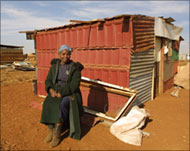S African boom leaves poor behind
Although the South African economy is enjoying its longest expansion on record, millions of poor South Africans have nothing to celebrate.

Sam Khumalo works feverishly in the muggy heat, sifting through mounds of garbage for empty bottles and other materials for recycling as flocks of black-faced sacred ibis circle hungrily above.
After failing to secure a formal job because of his lack of schooling and skills, the 32-year-old father of two has been eking out a living for the past two years scavenging in mountains of rubbish from Johannesburg’s affluent suburbs.
“There are no jobs anywhere, that’s why I am here. I collect empty bottles, paper, cardboard, scrap metal and anything that can be recycled. I sell them and the money helps me to buy food for my family. I cannot afford luxuries,” said Khumalo.
Laid off from his factory job five years ago, he said he earned up to 130 rand ($20.5) a week, depending on how hard he worked or what he found.
Familiar tale
Khumalo’s tale is all too familiar in a country where unemployment is officially estimated at 26.5% and is seen as a potential threat to social stability. At some rubbish dumps, people even scavenge for food.
 |
|
The growing economy has yet to |
Patrick Craven, spokesman for the powerful government-aligned trade union Cosatu, said “the poor majority have seen negligible benefits from the the boom. Some are even worse off than before because they have lost their jobs”.
Africa’s largest economy grew by 4.5% last year, after 3% in 2003, driven by strong household consumption and a rise in disposable income thanks to the lowest interest rates in more than a decade and a booming property market.
The economy is expected to grow by 5% this year.
Government optimistic
Retailers have reported strong sales growth, while vehicle sales are expected to reach a record this year.
The National Treasury Director General Lesetja Kganyago told a business breakfast recently, that “this economy is very strong and it’s pumping. This economy is now enjoying the longest expansion that we have seen in our economic history”.
|
“Many of the new jobs that have been created have been of such low wages and some so insecure that they have not provided a decent life for those workers” Patrick Craven |
But Cosatu says few new jobs are being generated, adding that those that are being created are poorly paid and temporary.
Some analysts, however, see evidence that the tide has turned and that growth is beginning to create more jobs – although perhaps not fast enough to soak up the waves of new entrants who are flooding the job market.
Data released this month by Statistics South Africa showed that the country’s non-farm sectors created 99,000 new jobs in the third quarter of 2005, a rise of 1.4%.
“Many of the new jobs that have been created have been of such low wages and some so insecure that they have not provided a decent life for those workers,” said Cosatu’s Craven, adding that job creation also needed to be much faster.
The low wages may be part of a global trend which has seen a steady decline in salaries for workers with few or no skills.
Help vs handouts
The government is adamant the economy is creating permanent jobs and says the problem lies with a poor skills base.
 |
|
The economy is generating jobs |
“This economy is generating jobs. The … South African economy is creating jobs of a high skills quality, whereas the profile of a typical unemployed is a young person with very limited education and with no experience,” said Kganyago.
“These (unemployed) people do not get absorbed easily into the jobs that we have created. We have to pay particular attention to the development of the skills base of our people.”
A joint survey from the South African government and the World Bank said this month that a skills shortage and the relatively high cost of labour were seen as the biggest obstacles to investment in the country.
Low investment
Investment in South Africa remains low at between 15 and 16% of gross domestic product – well below the 25% level the government is aiming for to reduce unemployment and poverty. The survey also identified rigid labour laws, exchange rate instability and crime as key constraints.
“Our own approach in this respect is to ensure that the majority of our people depend on their own participation in ordinary economic activity for their livelihood, not transfers from the state. Give people dignity” Lesetja Kganyago, |
Economists say the economy will continue to generate jobs in the short- to medium-term as the government seeks to reach its target of 6% growth by 2010.
The growth strategy will be driven by a 320 billion rand ($50.46 billion) public sector spending programme over the next three years.
“The good news is that economic growth is starting to create serious employment … we’re getting 33,000 jobs created every month. We expect this to continue for a while,” said Mike Schussler, economist at financial services group T-Sec.
COSATU says the government should provide a basic income grant for the unemployed and will continue pushing for salary increases above the government’s 3-6 % inflation target.
Rich elite
It wants to bridge the large income gap that still exists between a rich elite and the poor more than a decade after the end of white apartheid rule.
The government, which already provides state pensions and grants for children, is opposed to giving people handouts.
“Our own approach in this respect is to ensure that the majority of our people depend on their own participation in ordinary economic activity for their livelihood, not transfers from the state. Give people dignity,” said Kganyago.
“When you talk to people they want to take charge of their own destiny and you have got to grant them that opportunity. Unless we deliver education and health to the poor, then growth will not be shared growth.”